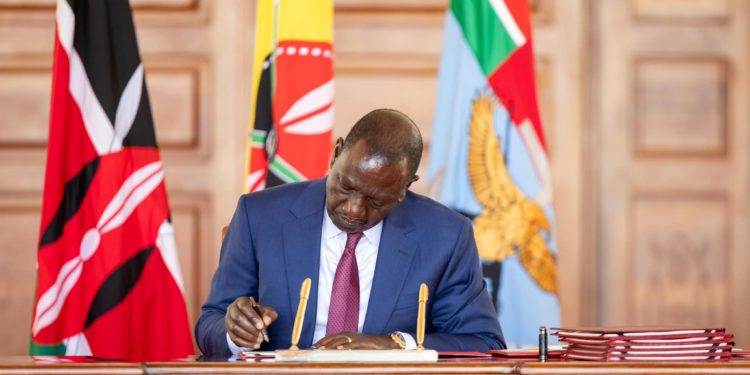President William Ruto has signed the Supplementary Appropriation (No. 2) Bill into law, following the withdrawal of the Finance Bill 2024.
This new legislation aims to address the resulting KES 344 billion revenue shortfall by implementing significant expenditure reductions while maintaining essential services in agriculture, health, and education, alongside enhanced remuneration for security officers.
In a statement from State House, Nairobi, President Ruto emphasised the bill’s role in reallocating resources to critical sectors. “The Supplementary Appropriation Bill makes available more resources for agriculture, education, and healthcare. It further anchors our Universal Health Coverage (UHC) through the funding of medical internship, UHC workers on contract, and Community Health Promoters. The Bill also supports the hiring of Junior School interns on permanent terms and the higher education new financing model.”
The bill outlines total reductions amounting to KES 145 billion, divided between KES 40 billion in recurrent expenditures and KES 105 billion in development expenditures. Notable reductions include KES 139.81 billion from the Executive, KES 3.7 billion from Parliament, KES 2.1 billion from the Judiciary, KES 6 billion from the State House and Deputy President, KES 7 billion from the National Treasury, KES 6.9 billion from medical services projects, and KES 17.3 billion from road and transport projects.
Despite the cuts, the government has allocated substantial funds to vital sectors. In agriculture, the bill provides a KES 7.5 billion subsidy for fertilizers, KES 3 billion for the Coffee Cherry Fund, KES 2 billion for a debt waiver for coffee farmers, KES 2 billion for milk coolers, KES 1.5 billion for milk price stabilization, and KES 0.7 billion to support sugar farmers.
In the education sector, the government has allocated KES 18.7 billion for the confirmation of Junior Secondary School intern teachers, KES 31.3 billion for the Higher Education Loans Board (HELB), and KES 17 billion for University Funding Board scholarships.
The health sector will receive KES 3.7 billion for the medical internship program, KES 4 billion for the primary healthcare fund, and KES 4.5 billion for the allowances and equipment for Community Health Volunteers.
Furthermore, the bill includes KES 3.5 billion for remuneration enhancement for security officers, in line with the recommendations of the Report of the National Taskforce on Police Reforms.












